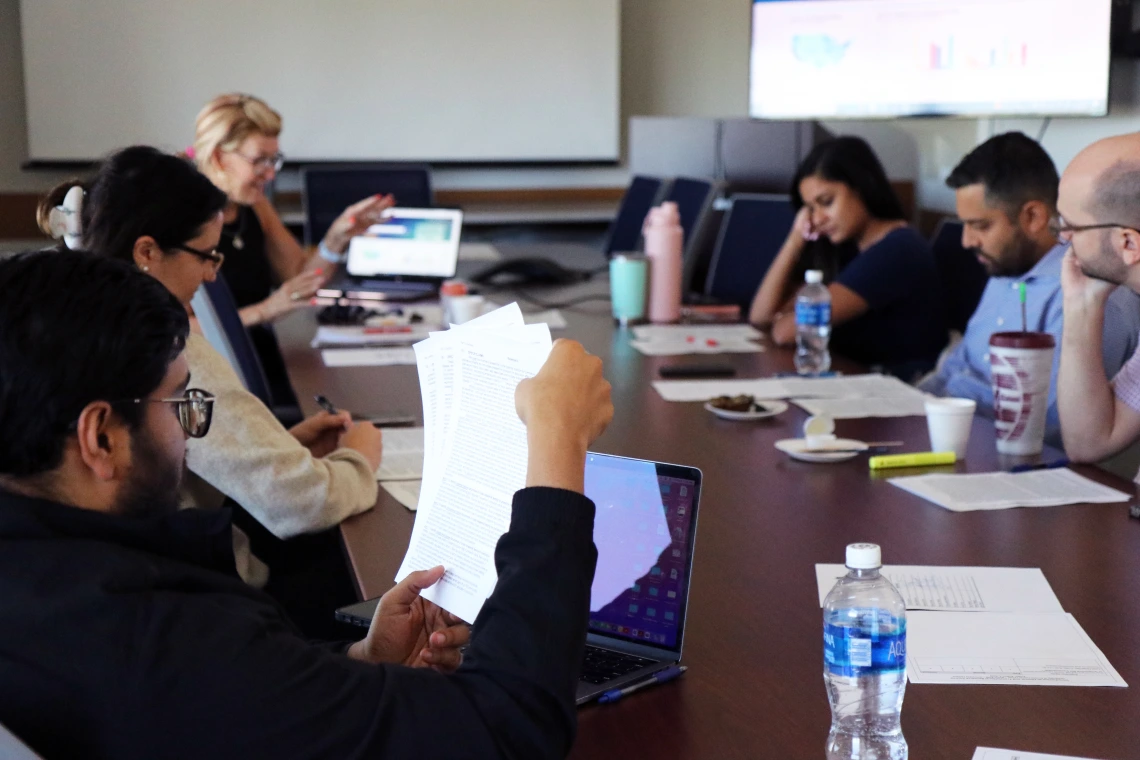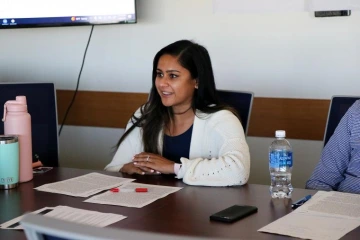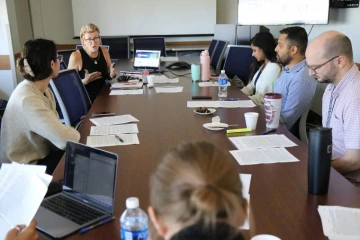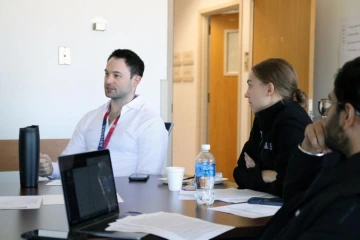Program takes students FAR to win grant funding
Early-stage investigators learn effective practices for submitting NIH F awards

When Julia Morris, a dual degree trainee in the MD/PhD program, began applying for a National Institutes of Health fellowship grant in January 2022, she found a UArizona Cancer Center program to guide her through the entire process called the F Award Readiness, or FAR, Program.
“The FAR program has provided unparalleled technical, logistical and emotional support throughout the grant development and submission process,” Morris said. “It taught me so much about the grant writing procedure and enabled me to submit my best work, which I know would not have been possible on my own.”
The rigorous, approximately 10-month FAR program assists early-stage investigators through a 6- to 11-month process that supports students in developing highly competitive NIH Individual Fellowships, referred to as F awards, that provide individual research training opportunities at the undergraduate, graduate and postdoctoral levels.

Student attends a grant writing workshop as part of the FAR Program.
During the FAR program, students attend writing workshops and develop their fellowship application elements, including a biosketch, background and goals, and a research strategy. The FAR program also assists applicants with developing a research training plan and a project narrative, and it helps participants with collecting letters of support and sponsor statements.
The program, which is a project of the Office of Cancer Research Training & Education Coordination (CRTEC), includes a mock panel review and other trainings to prepare applicants for a successful submission or resubmission.
Xinxin Ding, PhD, professor in Cancer Biology Program, Pharmacology and Toxicology and the BIO5 Institute, has served as a sponsor of students in the FAR Program.
He said that an NIH F30/31 award is an important career development tool for students and junior investigators, and that it highlights the University’s research strength and training environment, and the caliber of its trainees. Ding said that the FAR program offers students a solid career development plan.
“It helps training students become better organized, which is an essential skill for successful grant writing,” Ding said. “It provides important programmatic information about the funder and about training resources at UA, which are not always readily available to the students or even their mentors. It also helps to encourage students to apply.”
Supporting student grant-writing success
The FAR program was originally designed and developed in 2020 by Shelley Hawthorne Smith, PhD, associate director of the UArizona Graduate Center Office of Fellowships and associate director of the Graduate Writing Lab.
FAR Program workshop 2023-1.jpg

Carol Carpenter, top left, teaches at a FAR program workshop.
Carol Carpenter, the FAR program’s principal research administrator and grants writer, began at the Cancer Center in 2021, and the burgeoning program has since doubled in size. With just seven pre-doctoral students participating in Carpenter’s first year, the FAR program now has 20 predoctoral trainees and two more applying for the F99-K00, or Transition to Aging Research for predoctoral students, which is available to non-US citizens.
“Supporting pre-doctoral students through grant funding is essential for their careers, which is why growing the FAR program is important,” Carpenter said. “Many mentors are now really encouraging the program and CBIO [Cancer Biology] and CPC [Cancer Prevention and Control] strongly recommend it. The Integrated Scholars Training Grant (T32) program requires it.”
Morris’s project focuses on the characterization of drug resistance mechanisms in colorectal cancer. She has fully submitted and resubmitted her F30 application with revisions and is awaiting a funding decision.
As an F30 applicant, Morris said she put together a comprehensive mentoring team to address all areas of her training—both in research and in medicine—which led to three sponsors: Curtis Thorne, PhD, associate professor in UArizona’s Department of Cellular and Molecular Medicine and who is Morris’s principal investigator and primary sponsor; Aaron Scott, MD, associate professor in the Department of Medicine, co-program leader in the Cancer Center’s Clinical and Translational Oncology Program, who is chair of Morris’s dissertation committee and one of her co-sponsors; and Juanita Merchant, MD/PhD, associate director of the Department of Basic Sciences. Morris describes Dr. Merchant as someone who “represents the marriage of these two worlds as an incredible role model, a wonderfully successful physician scientist.”
Morris said she knows she would not have been able to fully and successfully submit her F award without her sponsors and the work of the staff, including the Office of Sponsored Projects, as well as the work of Carpenter.
“I want to launch a career in academic medicine and research as a physician scientist, and I know that grant writing is an invaluable skill—one that FAR strengthened for me immeasurably,” Morris said.
Pre-doctoral student Isabelle Tobey, a graduate student in her fourth year of the Cancer Biology Program, is also part of this year’s FAR program cohort. She learned about the FAR program from another student in the program, and that it helped her complete the daunting task of submitting an F award.
Tobey’s project is on human papillomavirus (HPV) and how it can dysregulate the innate immune system. Her co-mentors, referred to as sponsors when applying for grants, are Samuel Campos, PhD, associate professor in Immunobiology and Cancer Biology, and Koenraad Van Doorslaer, both experts in the field of HPV biology.
Tobey said both were supportive of her during the process.
“The FAR program was incredibly valuable because without it, I would not have finished this F grant,” Tobey said. I am not certain I would have been able to submit my F award without the FAR program and Carol. She was always there to help, support, and encourage me.”

Students attend a FAR Program workshop in August 2023.
Future goals of the FAR program team are to better support mentors to be even more involved with students as they design their research. They also planning to unveil “chalk talks,” which are short lectures given by students to expose them to multidisciplinary audiences to assist them in refining experiment design through constructive feedback.
The next FAR Program orientation is in November. To participate or for more information, contact Carpenter at crcarpenter@email.arizona.edu.



